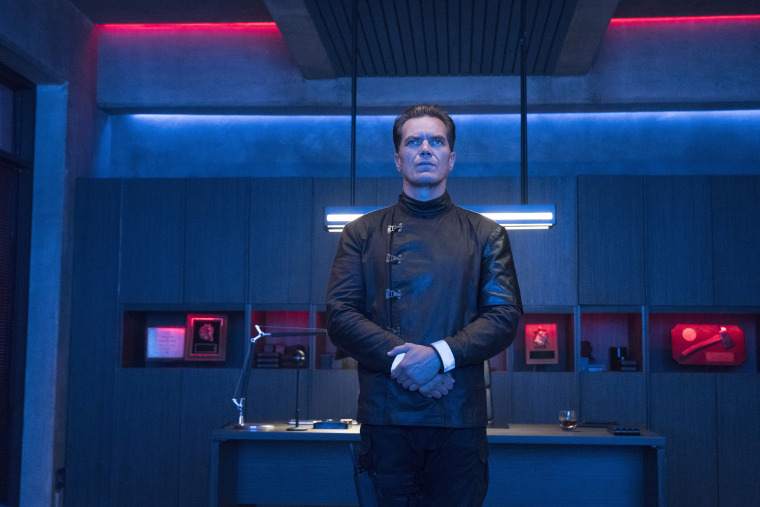While most people tune in to HBO for its TV, the channel also has also been dominant in the TV movie category since before “Oz” or so-called prestige TV was even an idea in a television executive’s head.
For 2018, the channel has four major releases planned, the first of which, “Fahrenheit 451,” is an updated take on the famous 1953 Ray Bradbury novel. HBO’s adaptation of “Fahrenheit 451” is a highlight in the current dystopian adaptation craze, with a presentation that ultimately hits far too close to home.
Dystopias first came into vogue in the 1920s with Russian writer Yevgeny Zamyatin’s “We,” in which the idea of the modern industrialized society goes to the logical conclusion that free will is the enemy of happiness. This work inspired many of the famous dystopian novels of the 1930s through the 1950s. Bradbury’s novel is a classic of the genre, and as such is often held up alongside George Orwell’s “1984” and Alex Huxley’s “Brave New World.”
The same anxieties that proliferated during the rapidly changing technological landscape of the 1920s and 1930s are back again, this time motivated by the information age.
The rise of fictional dystopias in our current climate isn’t just “everything old is new again,” however. The same anxieties that proliferated during the rapidly changing technological landscape of the 1920s and 1930s are back again, this time motivated by the complexities and vagaries of the information age. Zamyatin’s readers worried about technology we take for granted today; today we have personal assistant robots like Alexa, ads tailored to the conversations we have on Facebook and Amazon suggesting it would be perfectly rational for everyone in the country to allow its company access to our front doors.
Whether reading the “The Hunger Games” or “Children of Men,” readers seem to be trying to remind themselves that the world could be a lot worse — and we should act accordingly. “The Handmaid’s Tale,” for instance, sets itself in a world with a past exactly like our own, so audiences can draw the straight line from the little stuff we tolerate today to the totalitarian system we’ll accept tomorrow.
But “Fahrenheit 451,” without quite meaning to, all but posits that maybe reality is already becoming the stuff of nightmares. It posits a world where firefighters like Guy Montag (Michael B. Jordan) and his boss Captain Beatty (Michael Shannon) no longer burn books (as they did in the novel), but instead the hard drives and servers those books have been uploaded to.
And when Montag’s sort-of-girlfriend Clarisse (Sofia Boutella) declares that “we did this to ourselves,” meaning the reason no one reads books anymore is due to our own “dwindling attention spans,” the realization that many real school children will likely see this film before they read Bradbury’s actual work (if they do even read it) feels quite meta indeed.
Some of the upgrades to the novel’s world are hilariously on the nose. The internet, known here as “the Nine,” is run by the same people who broadcast a constant rolling news channel on the sides of buildings. The core audience of a film like this will probably read this as a dig at Fox News’ increasingly propagandist programming, but the channel’s pro-police bias could just as easily be lifted from CNN. Seemingly every surface is also converted into an internet-enabled screen covered in emojis and text written in what one might call “iMessage Modern Vernacular English.” The rise of emojis in a world where books are banned and “reading” is limited to a single (legal) provider is one of the film’s most ingenious conceits.
Firefighter Montag is himself presented as a modern celebrity with a popular Instagram feed full of short Vine-like vids showcasing his “firefighting.” (Michael B. Jordan’s serious charisma also goes a long way towards pumping up the image of the state. When he later turns against his minders the public’s negative response is immediate.)
The irony is that those things which trigger our anxieties today are exactly the sorts of things these novels believed to be terrible premonitions of the future. “Fahrenheit 451” is mainly remembered as being about how the destruction of books aids in the removal of ideas and free will. But Bradbury’s world is filled with details that just are not very scary anymore — because they’ve already happened.
HBO even removes some of them because they now feel so unnecessary. For instance, the novel's entire subplot of Montag’s wife and the “stories” that she watches on her “parlor walls” are gone, along with her turning him in to protect her entertainment consumption habit. One assumes the film took this out because said 53-inch television “parlor walls” are what a lot of its audience watches HBO on. (That plus it would have been too hard to get E! to give up licensing rights for "Keeping Up With The Kardashians.")
Screens are everywhere in this film as it is, functioning as a constant background visual. They cover every room from floor to ceiling. One doesn’t need to bring an iPad into the bathroom; the entire mirror is a portal to the internet. There’s a Twitter-like feed on the left-hand side, an Instagram-like vertical on the right, a livestream of the news in the top right-hand corner and the center is filled with endless floating emojis, creating a feeling akin to being immersed in a constant Facebook live video.

“Alexa” meanwhile has been replaced by “Yuxie,” a nine-eye camera suspended from the center of the ceiling in every room that broadcasts and records as well as obeys. I would put money on the fact that Jeff Bezos will be taking notes. Montag believes that she can be trusted to turn herself off when he needs privacy from the state; his savvier boss on the other hand sticks a brightly lit lamp over her, like one would over a parrot in a cage.
Bradbury’s book feared a world where insipid entertainment would lead to ignorance and indifference. This message still resonates; studies show those on social media are quicker to be cruel because they don’t see their fellow users as people. But there’s something ironic in watching a book turned into a TV special which decries the watching of television and blames the demise of books on the shortening of our attention spans.
Because at the end of the day, you just know the film’s creators still expect those at home to tweet along.
Ani Bundel has been blogging professionally since 2010. Regular bylines can be found at Elite Daily, WETA's TellyVisions, and Ani-Izzy.com.
Read more: Janet Jackson's Billboard Music Icon Award is a career-affirming moment for an underrated superstar
